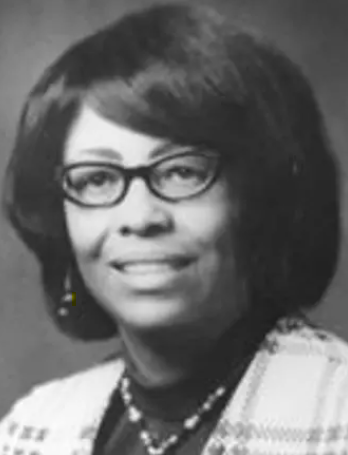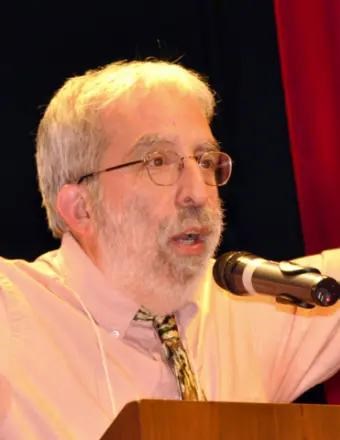Obituaries/Transitions
If you are a SSSP member and would like to post an obituary/transition, please contact the Administrative Office at sssp@utk.edu. Obituaries/Transitions will remain posted for 2 years.
Brett Lesley Cumberbatch, 1983-2025
 |
We are saddened to share the passing of one of our members. Click here to read his obituary.
Posted: 03/17/2025
Doris Y. Wilkinson, 1936-2024
SSSP Past President, 1987-1988
 In honor of her contributions, the Society established the Doris Wilkinson Faculty Leadership Award in 2015. If you would like to make a donation in memory of Dr. Wilkinson, please click here.
In honor of her contributions, the Society established the Doris Wilkinson Faculty Leadership Award in 2015. If you would like to make a donation in memory of Dr. Wilkinson, please click here.
Dr. Doris Y. Wilkinson, 88, passed away on Sunday June 23, 2024. Doris was born on June 13,1936 in Lexington, Kentucky to Howard T. and Regina L. Wilkinson. In addition to her parents, Doris was preceded in death by her sister, Carolyn Wilkinson-Baker. Survivors include first cousins: Janice LaRue, William Simms, Veronica Simms, Jacqueline French, Carol Ann Morton, Austin Simms (Daisy), Mary Jean Cowherd, JoAnn Washington (Robert), Albert Harris, John Harris (Darlene), Patricia Lewis and a special second cousin, Tommy Lee Lewis. Doris was a member of East Second Street Christian Church and attended Historic Pleasant Green Missionary Baptist Church.
She attended the Old Paul Lawrence Dunbar High School where she was Valedictorian of her graduating class and was also crowned homecoming queen. In the fall of 1954, just a few months following the United States Supreme Court Brown v. Board of Education ruling that separate schools for white and black students were unconstitutional, Doris enrolled at the University of Kentucky. Doris, being a part of the first class of African American four-year undergraduate students to integrate the university, graduated in three and a half years with her B.A. in sociology in 1958. She earned her graduate degrees from Case Western Reserve University, M.A, 1960 Ph.D., 1968. She also earned a master’s in public health from Johns Hopkins University in 1985.
Prior to beginning her career at the University of Kentucky, Doris was one of the earliest African American female faculty members at Kent State as an instructor of sociology and anthropology. In 1969, Doris began her career at the University of Kentucky when she joined the Department of Sociology and was the first African American woman to become a full-time faculty member. Just two years later she was recognized as an outstanding faculty member by the Associated Women Students group. During her tenure at the University, she founded the Forum for Black Faculty, which is considered to be the first social club for black women at the school, the Carter G. Woodson Lecture Series for untenured faculty, the Black Women’s Conference and was also the founder and director of Black Studies renaming it the African American Studies and Research Program.
In 1972, she was appointed to the Department of Interior Task Force on the National Parks System. She was listed in the Worlds Who’s Who of American Women in 1975. In 1976, she was appointed to the National Endowment for the Humanities Public Program Review Panel. Doris was appointed to the Board of Overseers of Case Western Reserve. In 1976, Doris was also appointed Chair of a social science panel for the National Science Foundation’s Women in Science Program. She was initiated into Phi Beta Kappa in 1978, and that same year was awarded a grant from the National Institute of Education to establish a research skills institute for women and minorities, the first institute of its kind under the auspices of the American Sociological Association. From 1980-1984, she served on the board of scientific counselors of the National Cancer Institute. In 1982 she was awarded a contract from the Southern Education Foundation to study black colleges and universities. In 1988, she received a grant from the Kentucky Humanities Council to study and plan a community wide exhibit on early African American physicians from 1890-1950. The resulting 1988 exhibit was titled "Forgotten Pioneers in a Southern Community: Black Physicians in Lexington from 1890 to 1950." In 1989, the exhibit was made into a semi-documentary by Kentucky Education Television. Additionally, this research produced the 1998 Directory of African Americans in Lexington, Kentucky, and a "Guide to the African American Heritage Trail in Downtown Lexington, Kentucky."
Doris was a recognized leader in the field of Sociology and held positions of President of the Eastern Sociological Society, Vice President of the American Sociological Association, President of the Society for the Study of Social Problems and President of the District of Columbia Sociological Society, an honor bestowed upon only a few women social scientists. Doris published numerous research articles and critical essays on race and gender. Doris also garnered many honors and awards, both national and local, including the American Sociological Association’s Dubois-Johnson Frazier Award for exemplary contributions to minority research and the field of race relations, the University of Kentucky Great Teacher Award, ,the Distinguished Professor Award from the University of Kentucky College of Arts and Sciences, the Public Understanding of Sociology Award from the American Sociological Association, and the Lifetime Achievement Award from Women Leading Kentucky. Doris was the first African American elected to the University of Kentucky’s Hall of Distinguished Alumni Award in 1989. She was also a visiting Ford Foundation Fellow at Harvard University from 1989-1990.
In 2015, the Doris Wilkinson Faculty Leadership Award was established and is awarded annually with a stipend of $500 to an outstanding faculty member who has exercised an extensive leadership role within the Society for the Study of Social Problems (SSSP) and other professional societies and within the larger community.
In 2019, Doris was one of three individuals chosen by the University of Kentucky to receive an Honorary Doctor of Humane Letters. This honor was announced during the University of Kentucky recognition of 70 Years of Integration event. Due to Doris’ health, she was unable to attend the event to receive this honor. Dr. Eli Capilouto, along with several of his provosts came to the nursing home in academic regalia to make the presentation at a private gathering and reception…that accommodation was very special to both Doris and her family.
In recognition of her efforts, the University of Kentucky established the Doris Wilkinson Distinguished Professorship in Sociology and the Humanities, the Doris Y. Wilkinson Conference Room in Breckinridge Hall, and the Doris Y. Wilkinson Award for Leadership.
Doris was the recipient of many more awards and recognitions, far too many to list, but no less important. She has written, published and reviewed many professional articles and books, including anthologies and co-authored books.
Doris’s extensive publications on race relations and her professional and community service contributions have left an indelible impression on those that called her colleague and professor and can be witnessed throughout Lexington and beyond.
Funeral services will be 1:00 PM on Saturday June 29, 2024 at Milward Funeral Home, 391 Southland Drive, Lexington KY 40503. Visitation will be prior to the service from 11:00 AM – 1:00 PM. Internment at Cove Haven Cemetery, 984 Whitney Avenue, Lexington KY.
Click here to read a Lexington Herald Leader article honoring Doris Y. Wilkinson.
Posted: 06/25/2024
Peter Conrad, 1945-2024
SSSP Past President, 1995-1996
 Read an additional In Memoriam from Dr. Phil Brown, Northeastern University.
Read an additional In Memoriam from Dr. Phil Brown, Northeastern University.
Peter Conrad, a pioneering medical sociologist who brought attention to the increasing medicalization of society, died in his home in Lincoln, Massachusetts, on March 3rd, 2024. He was 78 years old. He died at home, surrounded by loved ones, listening to Joan Baez. His cause of death was pneumonia after a long experience of Parkinson's.
Peter Conrad, the author of 16 books or monographs and more than 100 articles and chapters, was a dedicated academic at Brandeis University for more than 30 years, where he chaired both the sociology department and the Health: Science, Society, and Policy program.
Peter Franklin Conrad was born on April 12, 1945, in New York City to George Conrad and Gertrude (Rosenthal) Conrad. They were recent Jewish emigres from Germany and Austria, respectively. Conrad always proclaimed that he was a disobedient, distracted student during middle and high school school - one of the sources of his later interest in ADHD - and that he only came alive academically after taking sociology courses at SUNY Buffalo, now the University of Buffalo.
He went on to earn a master's degree from Northeastern University, in part to get a draft deferment from the Vietnam War. As a conscientious objector, he was assigned to do alternative service as an occupational therapy assistant at Boston State Hospital, a historic mental health institution. Witnessing interactions between patients, clinicians and the institution provided him with initial insights that would later lead him to apply sociological tools in examining the medical system's roles in society.
Combining this perspective with sociology's mid-century preoccupation with "deviance", he wrote his PhD dissertation at Boston University, which became his first book, Identifying Hyperactive Children: the Medicalization of Deviant Behavior. Peter began to understand that the diagnosis of hyperkinesis - later called hyperactivity, then ADD, and now called ADHD - "medicalized deviance". It transitioned a perceived "moral failing" into a medical diagnosis. This became a major theme in his research. As the subtitle of one of his most cited books puts it, medicalization transforms from "badness to sickness".
Over his career, he looked at how cultural and social factors in medicalization shape the definitions, perceptions, and experiences of alcoholism, depression, homosexuality, baldness, short boys and tall girls, among other conditions, in addition to ADHD. While many tried moralizing medicalization, Peter resisted that impulse. "I'm not trying to say it's good or bad," he'd often say, "I'm saying it's happening and we should understand it." Though his work was deeply analytical and theoretical, he always rejected the title of "theorist", but prided himself on "conceptualization".
Beyond medicalization, Peter studied the experience of epilepsy, worksite wellness programs, medical education, the social meanings of the new genetics, and illness on the internet. Graham Scambler, emeritus professor at University College London, once wrote that, when it comes to medical sociology, "people and things tend to revolve around Peter."
Peter was elected Chair of the Medical Sociology Section of the American Sociological Association in 1987 and elected President of the Society for the Study of Social Problems in 1995.
He was a dedicated teacher, mentor, and collaborator, and had tremendous pride in the accomplishments of his graduate and undergraduate students, even long after they became his colleagues.
Beyond sociology, Peter had an enduring interest in green spaces and rural heritage in Massachusetts. He served on the Lincoln Conservation Commission, the board of Codman Community Farm, and the community board of Drumlin Farm, a site of the Massachusetts Audubon Society. He also nurtured this interest in his annual vegetable garden, cultivating multiple potato varieties, giving many opportunities for his younger family members to squash potato bugs.
Peter was an avid traveler taking many journeys with his beloved wife and family. These included two sabbatical years abroad: one in Yogyakarta, Indonesia and the other in London, England. He was also a Distinguished Fulbright Scholar at Queens University in Belfast, Northern Ireland, and maintained close professional relationships with colleagues there through a twenty-year visiting faculty appointment.
One of the great joys of his later years was reuniting with a lost branch of his maternal lineage through family research that brought multiple branches of that family together in Munich and later in Washington, D.C. Peter spoke what he called "Kitchen German" from his emigre parents and engaging more deeply with his family history was deeply meaningful.
Though born in New York, Peter was a devoted Boston sports fan, particularly of his beloved Celtics, who were a constant comfort in his last years and a joy he shared with many family members and friends. After his diagnosis with Parkinson's in 2014, he also became deeply involved with Rock Steady Boxing at SLS in Lowell to maintain strength, mobility, and community. He was supported during this time by loving caregivers, most notably Annette and Moses Mugwanya, who were with him during the last four years.
He is survived by his wife, Libby Bradshaw, a physician and assistant professor at Tufts Medical School of Lincoln, MA; his daughter Rya Conrad-Bradshaw, an executive in EdTech of Concord, MA; a son, Jared Conrad-Bradshaw, an educational consultant of Istanbul, Turkey; as well as three grandchildren Rafi, Sela, and Avi, and a son-in-law, Drew Magliozzi, and a daughter-in-law, Rita Ender, both of whom he adored. He is also survived by close-in-heart family members across the world, students from multiple generations, dear friends of more than 50 years (including multiple housemates), and a dog he tolerated. He is predeceased by his sister Nina (Conrad) Furgiuele.
Arrangements are entrusted to Dee Funeral Home & Cremation Service of Concord. To plant trees in memory, please visit the Sympathy Store.
Posted: 03/06/2024
Kathleen Sue Lowney, 1958-2024

Dr. Kathleen Lowney passed away on Monday, January 8, 2024 after a short illness at the age of 65.
She was born in Butte Montana on November 27, 1958 to Lois and William Lowney. Kathe developed serious allergies and as a result they moved to Seattle. She had a strong interest in sociology and religion and entered the University of Washington where she double majored in Sociology and Comparative Religion. She then entered Drew University where she obtained a Masters degree and continued to obtain a PhD in Religion and Society. She met her future husband Dr. Frank Flaherty there who went to teach physics at Valdosta State College. They were married in 1986 and she moved to Valdosta where she obtained a position at VSU teaching sociology.
She loved teaching and was unafraid to experiment with new techniques for helping students to understand concepts. She was beloved by her students even though she held them to very high academic standards.
Her teaching ability was recognized by numerous teaching awards at the college, state and national level. She also served as the editor of the American Sociology Association’s journal: Teaching Sociology from 2010 to 2014. Dr. Lowney was also the driving force behind instituting a Teaching and Learning Center at VSU to assist faculty to improve their teaching.
Dr. Lowney did not ignore her responsibility as a professor to engage in academic research and publishing. During her time at VSU she wrote four books and 41 journal and book chapter articles.
Dr. Lowney's sister Terri is deceased, and she is survived by her sisters Mary Faure, Debra Hofbauer and Pat Jennings and their families as well as many relatives in Montana. Her kindness and brilliance shone through in her interactions with people. She will be sorely missed not just by her husband, but also by those who had the privilege of getting to know her.
The family will receive friends from 1pm to 3pm on Friday, January 12, 2024 at Townson-Rose Funeral Home Chapel in Murphy. Townson-Rose Funeral Home is in charge of all arrangements. You may send tributes to the family at www.townson-rose.com
Posted: 01/18/2024
Gray Arco Cavender III, 1947-2023

Gray Arco Cavender III passed away on August 8, 2023 from cancer, surrounded by his loving wife, daughter, and son-in-law. Gray served as Professor of Justice Studies at Arizona State University until his retirement in 2017.
He was born on February 24, 1947 to Nell Catherine Choate Cavender and Gray Arco Cavender, Jr. in Princeton, Kentucky, but he grew up in Waverly, Tennessee, where he was a member of the Waverly High School band and a DJ for the local Waverly radio station. He earned his bachelor’s degree in Business from the University of Tennessee (1969), followed by his J.D. degree from the University of Tennessee Law School (1971). After law school, Gray worked as a probation and parole counselor for the State of Tennessee Department of Corrections. In 1972, he assumed a position as Staff Attorney and Supervisor of Judicial Planning with the State of Tennessee Criminal Justice Planning Agency, and was eventually promoted to Assistant Director of the agency. While in this position, he also completed a Master’s degree in Psychology at Middle Tennessee State University, located in Murfreesboro, Tennessee.
Despite the importance of his position in criminal justice planning, Gray longed to return to academic life, to study criminology in greater depth, and to become a university professor. In 1975 he was accepted into the PhD program in Criminology at Florida State University, and so he packed his bags and moved to Tallahassee. In 1977, he accepted a position as an assistant professor at the growing Arizona State University in Tempe, Arizona. While an assistant professor at ASU, Gray completed his PhD in Criminology from FSU (1979). Gray remained on the faculty at ASU for the next 40 years, rising to the rank of Professor and focusing his research and teaching on media, crime and deviance, punishment, and law and society. Gray played a central role in the creation of the nation’s first PhD program in Justice Studies in 1985, serving as its inaugural director. With Pat Lauderdale, he published articles about the rationale for the creation of Justice Studies university degree programs. Over the years, he was a visiting scholar at New York University, John Jay College of Criminal Justice, University of California, Berkeley, Tulane University, and the Institute of Sociology at the Academy of Sciences of the Czech Republic.
Gray was an outstanding teacher and mentor, much admired by students. He was the recipient of several awards for his teaching, and in student exit surveys Gray was frequently mentioned as students’ most influential professor. He brought a wide knowledge of literature, history, and popular culture to his lectures and readily offered inspiration, encouragement, and support for research and theoretical projects. He was beloved by his graduate students, many of whom stayed in close touch with him right until his passing. Gray was an incredible mentor of graduate students and junior faculty alike, gently pushing them to be better and to focus on their goals and aspirations. Many students and colleagues have shared the experience of turning to Gray with a worrisome dilemma and receiving a thoughtful, practical solution. Talking with Gray meant everything would be alright. His students have gone on to prestigious careers as university professors, attorneys, and in other professions across the globe.
In addition to his stellar record as a teacher and mentor, Gray was a nationally and internationally recognized expert in crime, punishment, and the study of media coverage of justice issues. He is the author of scholarly articles, book chapters, and academic books. His work focused on the construction of crime, criminality, and justice policies that reinforced societal inequalities. His study of parole was among the first to point out that despite its ostensible rehabilitative purpose, parole actually served as a mechanism for the extension of social control of so-called dangerous populations (Parole: A Critical Analysis, Kennikat Press, 1982). Later, he critiqued the popular turn to the “justice model,” which advocated retributivism and just desserts as a justification for punishment policy (e.g., Criminology, 1984). His work on corporate and governmental deviance tackled the issues of why our legal system and popular media often fail to recognize the gravity of organizational wrongdoing. Expression of this theme included analyses of the cases of the Ford Pinto deaths, the Iran Contra Scandal, GM Pickup defects/deaths, and Enron price gouging and disintegration (e.g., Corporate Crime Under Attack: The Fight to Criminalize Business Violence, Anderson, 1987, 2006, with Francis Cullen, William Maakestad, and Michael Benson). He then directed his conceptual and methodological expertise toward media constructions of crime, reality, and justice. He began by focusing on the ways that reality crime television programs presented themselves as falsely authentic to viewers (Entertaining Crime: Reality Television Programs, Aldine Gruyter, 1998, with Mark Fishman). His media studies interests also included the presentation of gender and doing justice in fictional crime programs (Justice Provocateur: Jane Tennison and Policing in Prime Suspect, University of Illinois Press, 2012, with Nancy Jurik). His most recent publications included collaborations with Czech and US colleagues on gender, entrepreneurship and justice.
Gray was actively involved in the American Society of Criminology and the Society for the Study of Social Problems throughout his career. He served on several editorial boards during his career for journals such as Criminology, Justice Quarterly, Crime Media Culture, and served as Budget, Finance and Audit Chair for the Society for the Study of Social Problems.
While at ASU, Gray met a colleague who would later become his romantic partner for over 38 years, Nancy Jurik. Gray and Nancy were also research collaborators, giving presentations and publishing research on gender, work, criminal justice, and entrepreneurship. They spent lots of time traveling, hiking, and seeing many movies that they would talk about endlessly (or so said their friends). In 2017, Gray retired from ASU and began to devote most of his writing to crime fiction. His mystery novels, novellas, and short stories (Death of the Ayn Rand Scholar, The Pandemic Casebook of Jillian Warne, and forthcoming compilation, Echoes from Cherry Bottom) can be found on Amazon.
Survivors include his wife Nancy Jurik, daughter Jennifer Cavender Vaden and her husband James, grandson Michael Cavender Smith and his wife Melissa, and a great-grandson, Leo Smith. Gray was extremely proud of his family. He also had close ties to cousins Miriam Longino, John Longino, Daniel Gray Longino and their families (Sujata, Lela, and Diana). Gray will be missed by many students, colleagues, neighbors and friends. Gray was a kind, intelligent man who was always happy to help his friends and students. He told great stories, whether oral or written, always with a disarming sense of humor. We will miss him very much, but he will live on in our hearts.
Marjorie Zatz, University of California-Merced
Paul Knepper, San José State University
Posted: 09/11/2023
Find Archived Obituaries/Transitions Here.
